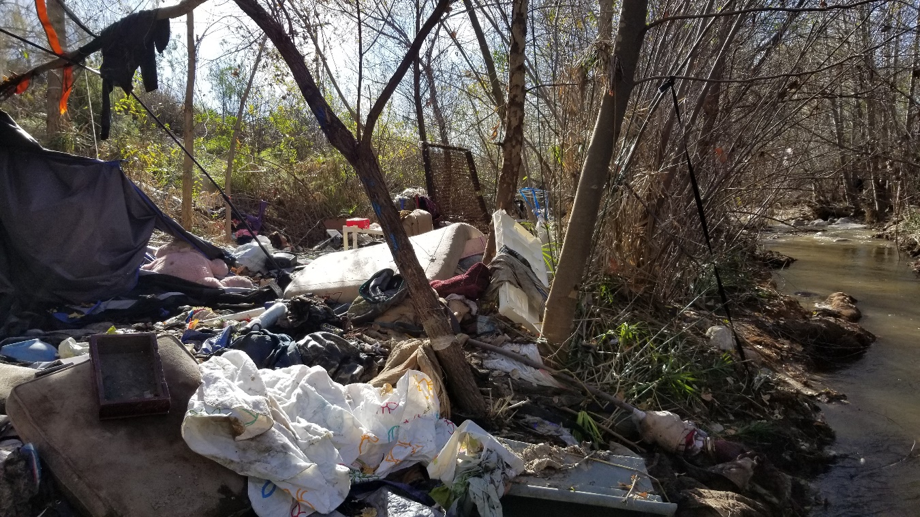
Photo provided by Inland Empire Waterkeeper, as part of its work with the Clean Camp Coalition to improve water quality along the Santa Ana River.
In
California, over 151,000 people were homeless in 2019 – a startling 17% increase since
2018. The need for housing has far outpaced available shelters and other
services, leaving 69% of these individuals unsheltered and left living on
streets, in parks, or along California’s rivers and streams. Unfortunately,
this housing crisis not only means that thousands of people are left
unsheltered in California, but significant amounts of trash and bacteria enter
California’s rivers and streams as these individuals lack access to basic
services.
Local organizations and communities have stepped up to tackle and stop this
flow of pollution into the waterways we love. In the Russian River, we’ve seen
incredible success of a grassroots program led by Clean River Alliance – and
fiscally sponsored by Russian Riverkeeper – to engage homeless in helping haul
out their trash and keep a clean camp by providing free weekly trash pickup to
homeless encampments along the river and helping connect homeless residents to
other available services, qualifying participants for transitional housing. The
program has been so effective at removing sources of trash along the Russian
River that entire beach clean-ups have been cancelled – due to the lack of
trash. This is one example of the incredible programs that go beyond removing
trash from the riverbank, but creates a community dedicated to helping one
another and their surrounding environment.
There’s no doubt this is a delicate situation and tricky challenge for communities to grapple with – on one hand, there are people in need of housing that should not be subjected to living on city streets or along rivers. Period. On the other, the environmental impact caused by the trash and human waste discarded in these areas needs to be managed – until permanent housing can be secured.
CCKA surveyed five programs across the state – from the Russian to the San Diego River – to identify the variety of approaches used by organizations primarily focused on the health of their local communities and waterways, and found three key principles for a successful program:
Establish Trust.
Engaging with people directly, introducing yourself, your organization, and why you’re there is key to building relationships, establishing trust, and ultimately ensuring engagement in any trash-removal effort. Experiencing homelessness is an unsettling and traumatic experience, and being consistent – be there when you say you will – allows others to trust you and your organization. Trust and consistency are key – many have given up on them before.
Promote Individual Agency.
Everyone has their own story and individual path to homelessness. And importantly, those living on city streets and along rivers are people who do not want to be living in their own waste. By engaging with individuals directly and holding them responsible for their own trash – by providing them with a trash bag and schedule trash pick-up time – they can gain individual agency and demonstrate that they are able to keep appointments and commitments themselves. Which not only results in cleaner, healthier camps and waterways, but can actually be used to qualify people for transitional housing.
Forge Partnerships.
Addressing homelessness is a complex, multi-faceted issue. Not one agency or organization alone can provide all of the services and connections needed. To engage homeless individual living along California’s rivers and streams, which are often difficult to reach and often unsafe due to the terrain, it’s vital that organizations and agencies come together and play to their strengths. For example, water quality and watershed-based organizations can collect data regarding the presence and location of encampments during routine water quality testing and river surveys, and share that data with local service providers and city services to pick up collected trash from that area. It takes a community to support each other, engage those who are among the most vulnerable in our society, and protect our rivers, streams, and beaches.
We’re excited to elevate the lessons-learned from grassroots programs across the state to inform a statewide “Trash Hot Spot” program, which is currently being considered by the State Water Board to address sources of trash that exist outside city limits, and promote the state’s Trash Policy to eradicate trash in California’s rivers, streams, and beaches. These principles and tools will also be shared with the Governor’s Homelessness Task Force.
Read our full Homeless Engagement Report and Best Practices Summary to learn more about engaging those experiencing homelessness in your community to promote both safe camps and healthy waterways.

Policy Manager Kaitlyn Kalua represents CCKA and its member Waterkeepers in state regulatory and legislative forums to advance statewide water policy.



